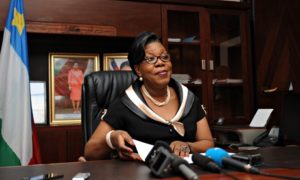
But no chalice carries more poison than that handed to Catherine Samba-Panza in January when she became interim leader of the Central African Republic (CAR), one of the continent’s most failed and forgotten states. She must try to tame a hurricane of revenge killings between Christians and Muslims that has seen thousands flee the country and led the U.N. and others to warn of a potential genocide. And she only has a year to do it.
Walking regally into her somewhat kitsch office, with four photos of herself displayed behind her desk, Samba-Panza appeared nothing if not self-assured. The 58-year-old addressed the nation through the state broadcaster while projecting glamour bordering on bling with red nail varnish and gold and white necklaces, bracelets, earrings and gleaming adornments on a black dress. Then she chastised a French TV crew for having headlined a gruesome lynching at a recent military ceremony instead of the speech she gave at the same event.
When asked by The Guardian about the politicians who inspire her, the French-speaking Samba-Panza made clear she was aiming high. “I take the president of Liberia, for whom I have great admiration, as a reference point,” she said. “She’s a woman who came to power in almost the same situation as me. She became the head of the country at a moment of great difficulty in a post-conflict period with many security problems.
“I can make an analogy between the situation in which Mrs. Johnson Sirleaf arrived and my situation in the CAR. It’s a very difficult situation, it’s true, but I think finding a solution is not impossible. It is within our grasp and, with the will and the involvement of all the people and with the help of the international community, we can arrive at a solution.”
Read the full story at theguardian.com

